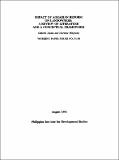| dc.contributor.author | Llanto, Gilberto | |
| dc.contributor.author | Dingcong, Clarence | |
| dc.coverage.spatial | Philippines | en_GB |
| dc.date.accessioned | 2014-04-07T17:18:24Z | |
| dc.date.available | 2014-04-07T17:18:24Z | |
| dc.date.issued | 1991 | |
| dc.identifier.citation | Llanto, G. & C. Dingcong (1991) Impact of agrarian reform on landowners : a review of literature and a conceptual framework. Working paper series, 9114. Manila : PIDS. | en_GB |
| dc.identifier.uri | https://opendocs.ids.ac.uk/opendocs/handle/20.500.12413/3776 | |
| dc.description.abstract | The 1987 Consultatution provides that the state shall promote comprehensive rural
development and agrarian reform " It requires the state to provide incentives to landowners to
encourage them to invest the proceeds of the compensation for their lands under agrarian reform
to promote industialization, employment creation, and privatization of public sector enterprises
It provides that financial instruments used as payments for lands shall be honored as equity m
public enterprises where landowners chose to invest These consultations are a major
feature of the Comprehensive Agrarian Reform Program (CARP) signed into law (Republic Act
6657) by President Corazon C Aquino on 10 June 1988
Philippine studies on agrarian reform have dealt largely with the agrarian reform
beneficiaries and the reform s effects on their welfare and production efficiency Very little
work has been undertaken on the agrarian reform's other major actor the landowner This is
rather surprising in view of the important role expected of landowners in promoting
industrialization and employment.
This paper presents a review of literature and related experiences on the impact of
agrarian reform on the landowners, for two main reasons: (1) landowners are a legitimate
concern of the government, and (2) policymakers and even social scientists view landowners as
potential investors, entrepreneurs, and industrialists. The usual expectation is that landowners
will assume another role, that of investors and entrepreneurs, once displaced from their land and
given government incentives for them to join industry. It is interesting and significant to find
out to what extent the expectation is realized, and if the contrary happens, to determine Why. | en_GB |
| dc.language.iso | en | en_GB |
| dc.publisher | Philippine Institute for Development Studies | en_GB |
| dc.relation.ispartofseries | PIDS working paper series;9114 | |
| dc.rights.uri | http://creativecommons.org/licenses/by-nc-nd/3.0/ | en_GB |
| dc.subject | Agriculture | en_GB |
| dc.subject | Governance | en_GB |
| dc.title | Impact of agrarian reform on landowners : a review of literature and a conceptual framework | en_GB |
| dc.type | Series paper (non-IDS) | en_GB |
| dc.rights.holder | Philippine Institute for Development Studies | en_GB |
| dc.identifier.externaluri | http://www.pids.gov.ph/publications.php | en_GB |
| dc.identifier.koha | 97252 | |


